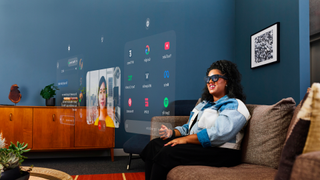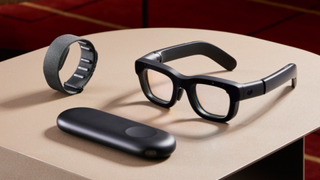Meta’s game-changing Orion AR glasses could launch sooner than we thought, but they might cost as much as a smartphone
“It’ll be a couple years, but not decades"

Meta Connect 2024 was packed with announcements: the Meta Quest 3S was unveiled, the Ray-Ban smart glasses got new features, and Meta AI is getting upgrades too (including one that will dub Instagram Reels recorded in other languages). But the most flashy reveal was Orion – Meta’s first full-functioning holographic AR glasses prototype; and while Mark Zuckerberg was careful not to promise when we might see a consumer-grade pair, Meta’s CTO was more than happy to share some details.
Andrew Bosworth – @boztank on Instagram – often does AMA sessions in which he answers all sorts of questions about Meta’s tech. Post-Connect, plenty of questions were focused on Orion, and one user asked “How long until we can have our own AR glasses and around what price.”
While he didn’t give too specific an answer, Bosworth replied: “It’ll be a couple years, but not decades,” suggesting that we might see a consumer version of Orion relatively soon. My bet is that we’ll see them sometime around 2027, partly because that fits with the timeline Bosworth suggested, and partly because it matches the timeline laid out by a The Verge report from early 2023 that leaked details of Meta’s internal roadmap, which pegged 2027 as the year AR glasses would hit store shelves.
Lots could change in the next couple of years of course, but hopefully we’ll be able to wear Orion for ourselves sooner than some might have expected. The other big question, though, is will we be able to afford them?

Pricier than first predicted
On that note, Bosworth added that the price might not be quite as affordable as we'd initially hoped. Meta has said – and Zuckerberg mentioned this in the keynote – that one goal it must achieve before launching Orion for consumers is it must make the glasses more affordable. We took that to mean it’s targeting a price point around $299 / £299 / AU$449 – the price of the Ray-Ban smart glasses.
In his post, though, Bosworth said they “probably won’t get in at, like, a Quest 3S price point, or even a Quest 3 price point” – which immediately puts them over $499.99 / £469.99 / AU$1,049.99.
Instead Meta seems to be aiming at being affordable in terms of phones and laptops – which to me would be somewhere around $700 (around £700 / AU$1,350). Admittedly, this makes a lot of sense – $299 / £299 / AU$449 would be a surprisingly low price for smart specs that are being billed as an eventual smartphone replacement.
Get the best Black Friday deals direct to your inbox, plus news, reviews, and more.
Sign up to be the first to know about unmissable Black Friday deals on top tech, plus get all your favorite TechRadar content.
That said, price aside, it might take Orion a little longer than a couple of years to start eating the best smartphones' lunch. In another segment of the Q&A Bosworth revealed that Orion only has a two-to-three-hour battery life – roughly the same as the Meta Ray-Ban smart glasses. That's certainly not bad for an AR wearable, but it's a long way from being the full day we expect from our smartphones.
Hopefully a battery upgrade won’t be decades away either.
You might also like

Hamish is a Senior Staff Writer for TechRadar and you’ll see his name appearing on articles across nearly every topic on the site from smart home deals to speaker reviews to graphics card news and everything in between. He uses his broad range of knowledge to help explain the latest gadgets and if they’re a must-buy or a fad fueled by hype. Though his specialty is writing about everything going on in the world of virtual reality and augmented reality.
Most Popular
